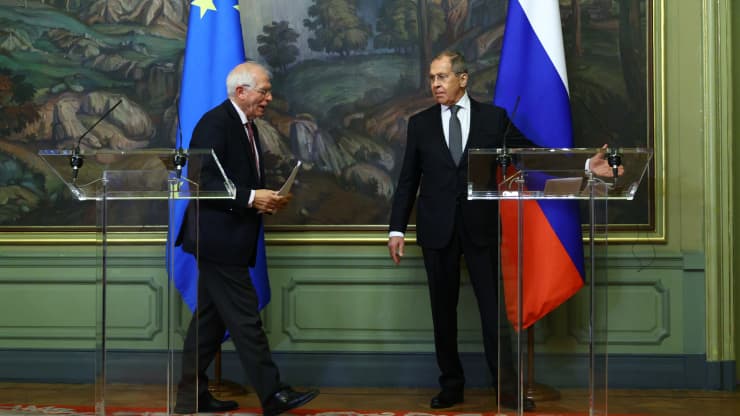Russia has said it is ready to cut ties with the European Union, according to a fragment of an interview published on Russia’s foreign ministry website Friday morning. The comments mark yet another escalation in tensions between the two sides.
When asked if Russia was heading for a break with the European Union, Russia’s Foreign Affairs Minister Sergey Lavrov said: “We proceed from the fact that we are ready (for that). In the event that we again see sanctions imposed in some sectors that create risks for our economy, including in the most sensitive spheres,” according to a translation of the comments by Reuters.
“We don’t want to isolate ourselves from global life, but we have to be ready for that. If you want peace then prepare for war,” Lavrov added.
Neither the Russian foreign affairs ministry nor the European Commission, the executive arm of the EU, was immediately available for comment when contacted by CNBC on Friday.
The relationship between Russia and the EU hit a new low last week when the EU’s foreign policy chief, Josep Borrell, visited his counterpart in Moscow. It has since been described as a “humiliating” trip by analysts.
Borrell went to voice the EU’s opposition to the arrest of Alexei Navalny, a fierce critic of Russian President Vladimir Putin. However, he accused Russia of putting together “an aggressively-staged press conference” during his trip.
In remarks to the press, Lavrov said that, “the EU is not a reliable partner, at least at the current stage.” Borrell failed to address that comment, which sparked anger among some European lawmakers.
In addition, Borrell learned via Twitter during a meeting with Lavrov that Russia had expelled three EU diplomats for attending demonstrations in support of Navalny.
“An aggressively-staged press conference and the expulsion of three EU diplomats during my visit indicate that the Russian authorities did not want to seize this opportunity to have a more constructive dialogue with the EU,” Borrell said in a blog post two days after his trip.
As a result, he has suggested that the EU should impose fresh sanction on Russia — a decision that needs to be approved by European governments.
It would not be the first time that Russian companies and individuals have been sanctioned by the EU. Their relationship has deteriorated significantly since Russia’s annexation of Crimea in 2014, but ultimately their ties are hugely important to both given their shared economic, energy and strategic interests.
Analysts have told CNBC that the latest differences between Moscow and the EU could put pressure on the gas pipeline being built from Russia to Germany, Nord Stream 2.
The project has been sharply criticized, including by the United States, which has imposed sanctions on companies working on the pipeline — a stance that new U.S. President Joe Biden has shown no indication of changing.













